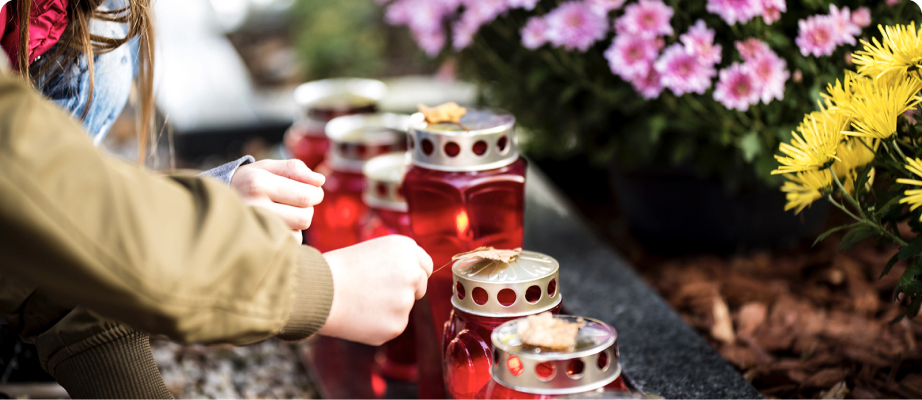Advice Center
Get tips and explore common end-of-life topics.

How to Plan an Interfaith Funeral
UPDATE
Dying, much like living, is full of complexities.
Death is a life event that brings together people from all areas of your life - along with the belief systems they hold.
It brings up complicated emotions and can even renew an interest in faith or strengthen existing beliefs. Faith also plays a big role in dying because the transition to an afterlife, and how one’s life informs that process, is a cornerstone of most religions.
Unfortunately, conflicts over faith within families can be stressful. Paired with the stress of losing a loved one, it can make funeral planning downright difficult.
What is an interfaith funeral?
An interfaith, or multi-faith, funeral blends different religious traditions to represent the needs of multiple faiths. They are common, especially because one in five Americans come from multi-faith backgrounds.
Picture someone who has grown-up with one Catholic parent and one Jewish parent. There are different faiths influencing their life, both of which may come into play when funeral planning.
An interfaith funeral can be as simple as incorporating a small aspect of religion into an otherwise secular celebration of life, to holding two different funeral services for two different faiths for the same person.
Where you fall on the spectrum is entirely up to you - and the wishes of your loved one.
Where to start
First and foremost, consider what your loved one would have wanted.
If they had a detailed funeral plan in place, complete with all of their faith-related wishes, then that’s the path to follow. Of course, there are compromises within it to ensure the family is happy and comfortable. But, your best course of action is to think of them first.
Next, look at the faith-based communities they were a part of. You can also lean on the expertise of the funeral director you choose.
Workwith funeral directors: They are the experts. Funerals vary so widely when it comes to incorporating faith, funeral directors have seen it all. Ask them for their expertise and any best practices they can share for pulling a multi-faith funeral off, especially in cases where there may be family tension.
Partner with church leaders: If your loved one wants an interfaith funeral, reach out to the religious leaders in their community. Some leaders will be open to working alongside a member of another faith. Others may not. It depends entirely on the person, but make sure there are aligned expectations on both sides.
You can also seek out a specific multi-faith celebrant. They specialize in leading funerals representing multiple faiths.
Talk to your family: Although funerals are celebrations of life for the person who is gone, it’s those who are left to mourn who will remember the experience. Consult with members of your family to understand how important religion is to them. If there is a member of the family who is particularly close to the deceased and feels passionately about including something, that might help you make decisions around planning.
Blending religious traditions
In the following section, we highlight several of the most common religious funeral traditions. These might be among the traditions you’re trying to blend together.
In this section, we will cover some of the ways you can incorporate faith into a multi-faith funeral.
The celebrant: This is the religious leader who leads the funeral service. In some cases, you may have just one celebrant from one faith. Or, you may have multiple people representing different faiths at different stages of the event.
Readings: At a secular funeral, people often read passages from books or poetry that speak to the life and death of the person who passed. At a religious funeral, there are often hymns, prayers or bible verses shared. For a multi-faith funeral, incorporate both into the program.
Music: Music helps set the tone for funerals. For a multi-faith funeral, you can incorporate religious songs, as well as those who may just be well-loved by the deceased.
Program: The funeral program is often a keepsake for loved ones. You can include someone’s favorite quote, as well as their favorite spiritual verse.
Burial site: Even if you opt for a funeral that aligns more closely with one religion, you can choose a specific burial site for your loved one. There are often cemeteries specific to religious groups that can be found through research in your community.
Burial ritual: Burial rituals are often unique and detailed when it comes to religion. You might opt to hold a multi-faith service but align with one particular religion for the burial ritual.
Different religious funeral customs
If you are planning a funeral for a loved one where the religion differs from your own and aren’t sure where to start, we’ve put together a few guides on funeral rituals for four different religions.
- How to Plan a Jewish Funeral
- How to Plan a Catholic Funeral
- How to Plan a Buddhist Funeral
- How to Plan an Islamic Funeral
This list is by no means exhaustive and there are a host of different religions your family might affiliate with. We recommend doing some research and consulting with religious leaders in your community to understand funeral rituals and traditions.
Opting for a secular or alternative funeral
If there is a clash between religions in your family, you may want to opt for something entirely secular.
In this case, you would likely hold the funeral itself in a hall within the funeral home, or at a nearby location like a community hall or rental venue. The funeral home itself is likely your best bet and easiest course of action to follow.
In the case of a secular funeral, the occasion may be led by a chosen representative of the family. You would avoid any faith-based messaging or religious symbols. Family-led funerals are common across North America, especially for those struggling between faiths.
There are also entirely different funeral approaches to take, like:
Family memorials: In this case, you don’t hold a funeral or burial at all. You may opt for a direct cremation and instead hold a family gathering in someone’s home - or at the venue of your choice.
Humanist funeral: This is not all that different than a secular funeral. It’s very family-driven and focuses on remembering and celebrating the deceased. There are specific humanist celebrants who can lead the funeral.
Green burial: Green burials are burials in their simplest form - returning a body to the earth, without adornments, chemicals or technology. The deceased is buried directly in the earth, without any preservation or embalming. To protect the natural environment around the grave, there is no graveside service. Loved ones can gather separately or memorialize the deceased at a communal spot in the burial grounds.
Coming to a compromise
Above all, the role of a funeral is to celebrate the life of a loved one. It’s an opportunity to remember them in the way that best represents who they are and what they held dear.
Whether you opt for a multi-faith funeral, a secular one or one faith, the most important thing is to celebrate their life in a way your loved one would be proud of.
Sources:
https://www.funeralguide.com/blog/interfaith-funerals
